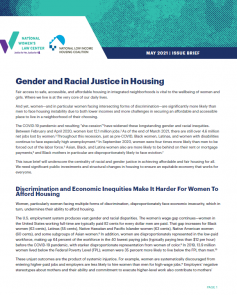Abortion rights, women of color, and LGBTQIA+ people are under attack. Pledge to join us in fighting for gender justice.
Fair access to safe, accessible, and affordable housing in integrated neighborhoods is vital to the well–being of women and girls. Where we live is at the very core of our daily lives. And yet, women—and in particular women facing intersecting forms of discrimination—are significantly more likely than men to face housing instability due to both lower incomes and more challenges in securing an affordable place to live in a high-opportunity neighborhood. The COVID-19 pandemic and resulting “she-cession” have widened these longstanding gender and racial inequities.
This issue brief, co-authored by the National Low Income Housing Coalition, underscores the centrality of racial and gender justice in achieving affordable and fair housing for all. The issue brief lays out how:
- Discrimination and economic inequities make it harder for women to afford housing;
- Lack of affordable housing undermines the health, education, nutrition, and employment of women and the children and families who depend on them;
- Affordable housing is critical for women, children, and families, and housing assistance helps women of color, survivors, LGBTQ people, people experiencing homelessness, and women with disabilities;
- Discrimination in housing further limits housing options for women and their families;
- Trump administration rulemakings threatened safe, accessible, and affordable housing for women, children, and families; and
- Advocates and policymakers have an opportunity to improve our policies and systems so that every woman, child, and family can obtain safe, accessible, and affordable housing.

